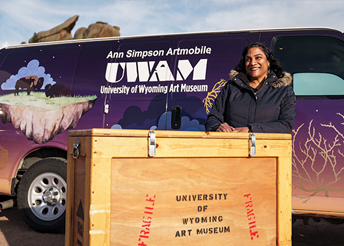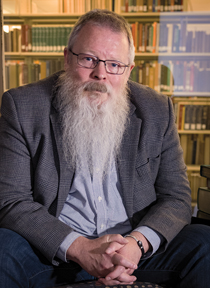
Contact Us
Institutional Communications
Bureau of Mines Building, Room 137
Laramie, WY 82071
Phone: (307) 766-2929
Email: cbaldwin@uwyo.edu
For the People
Published January 24, 2024

Nicole Choi, director of the Low Income Taxpayer Clinic, meets with Simona Wambeke,
a student in the clinic’s course.
UW supports programs that directly benefit the state’s citizens.
By Micaela Myers
Low Income Taxpayer Clinic
Not long ago, a woman contacted Nicole Choi, director of the Low Income Taxpayer Clinic in the College of Business Department of Accounting and Finance. The woman had been homeless and struggling with substance abuse but was getting her life in order and planned to attend nursing school. To apply for student aid and loans, she needed to be current on her taxes. The first place she went wanted to charge her $5,000. The taxpayer clinic helped her get her taxes current free of charge. In another case, a single mom of three on the Wind River Indian Reservation was living on Social Security, and the clinic helped her collect $11,300 in tax refunds.
Clinics like these are part of a federal grant program administered by the IRS. Until 2022, Wyoming was one of only four states without one. Representation is free for qualified low-income taxpayers, while consultations are open to anyone. The clinic works alongside the longstanding Albany County Volunteer Income Tax Assistance (VITA) program, a partnership between the College of Business Department of Accounting and Finance and United Way that assists individuals in filing tax returns.
“Any tax issues that you have with the IRS, we can help with,” Choi says. “It often starts with a letter from the IRS saying they found an error and you owe them money. We can help with installment plans, or sometimes we can negotiate with the IRS. Other times, the IRS is wrong and clients don’t owe anything.”
Students pursuing a master’s in accounting and finance assist clients, which provides the students with hands-on learning, and a pro-bono panel of attorneys from Holland & Hart of Jackson helps with the court side of things.
“Taxes are scary to people, and court is very scary,” Choi says. “We not only represent and help clients — we also do educational activities around the state to make taxpayers aware of their rights and benefits. We need to spread the word so that residents know about these services.”
WIND ECHO for Families
About 17 percent of children age 3-17 have one or more developmental disabilities, and families living in rural areas often have difficulty accessing experts, resources or support networks. However, thanks to the Wyoming Institute for Disabilities (WIND) ECHO for Families network, families in Wyoming are receiving the help they need.
“ECHO for Families is a virtual community that provides opportunities for learning, advocacy and mentorship with families who have a child with autism, other developmental disabilities or other special health care needs,” explains WIND Senior Project Coordinator Cari Glantz. “This network allows families to receive professional support and brainstorm evidence-based and reality-informed solutions and share successes with other families around the state.”
The sessions are held biweekly via videoconference, with many families attending in regional groups. In addition to in-person gatherings in Laramie and Green River, a group for Spanish-speaking families recently formed in Casper. Participants all report that their knowledge and skills increased.
“The ECHO sessions have been a great opportunity for families to connect, learn and share,” says Lorenza Trevizo, a bilingual family support specialist with Parents as Teachers in Casper, who coordinates the Spanish language group. One of the participating parents adds, “The information that was shared has provided me with new insights into ways of working with my boys.”
Project ECHO is a model developed in 2003 at the University of New Mexico that provides low-cost high-impact intervention that links specialists with local experts through virtual meetings. This model has application in many different settings.
Glantz says, “Based on the success of this learning model, we serve as a national example of how to virtually connect families in rural and underserved communities to increase their capacity and improve their desired outcomes.”

Ann Simpson Artmobile Educator Sarita Keller travels to dozens of Wyoming towns
each year.
Ann Simpson Artmobile
While anyone can look at works of art online, a kindergarten student in Arapahoe, Wyo., demonstrated why it’s also important to see artworks in person. UW Art Museum Ann Simpson Artmobile Educator Sarita Keller tells the story. One kindergartner turned to the other and said, “What’s the big deal, we could just look at this on a computer.” The other responded, “Well, then you can’t feel it with your eyeballs.”
“There’s a special reaction when they know it’s the actual work of art,” Keller says.
In addition, Keller believes that the UW Art Museum collection belongs to the entire state: “How do most residents get to see them unless the works come to them? It’s like me bringing the field trip there.”
Keller visits about 20 Wyoming towns per year with the Artmobile, sharing the artworks and leading lessons and workshops. She partners with schools, libraries, senior centers, museums and other organizations to tailor each experience, often staying up to a week. Her current Artmobile printmaking exhibition includes 17 original pieces.
UW started offering touring exhibitions back in 1969. The pieces would be shipped in crates. In 1982, UW supporter and Art Museum board member Ann Simpson helped create a position for a traveling curator, and soon the Artmobile experience was born. It’s the longest running of its kind, Keller says.
Fundraising support comes from the Julienne Michel Foundation, Helga and Erivan Haub, Ann and Alan Simpson, Genesis Alkali LLC, Rocky Mountain Power Foundation, Union Wireless, Wyoming Public Radio, the Wyoming Arts Council through the National Endowment for the Arts, the Wyoming State Legislature and other generous donors.
“Everywhere I’ve been, I’ve always been warmly welcomed,” Keller says. “People are happy to have something different coming to town. I feel like the special thing is that it’s like having an artist in residence and a museum in one.”
Legal Clinics
For too many, unresolved legal problems are the root of stress-related health issues and the loss of jobs, homes, children and liberty. According to law school Professor Dona Playton, “The COVID-19 pandemic disproportionately affected low-income people, especially seniors, veterans, children, survivors of domestic abuse and people in rural areas. Most Americans don’t receive any or enough legal help for their substantial civil problems.”
Playton supervises students in UW’s Family and Child Legal Advocacy Clinic, providing legal services in family law, child advocacy and domestic violence cases. The clinic helps bridge the access-to-justice gap by handling civil legal cases for low-income people in Wyoming. UW’s Wills and Estate Planning Clinic helps clients with end-of-life planning and decision-making. Students in the Defender Aid Clinic focus on post-conviction relief actions, including federal and state appeals and sentence reductions.
“Our experiential programs at the College of Law set our law school apart and help ensure our students are practice-ready and can hit the ground running upon graduation,” Playton says.
Other outstanding experiential opportunities include the Prosecution Assistance Program; the Energy, Environment and Natural Resources Clinic; the International Human Rights Clinic; the Entrepreneurship and Business Law Practicum; and a Local Government Assistance Practicum. The College of Law has been recognized by Pre-Law Magazine for providing outstanding practical training opportunities for students and communities around the state and beyond.
“My experience in the Civil Legal Services Clinic has undoubtedly been the best part of my legal education,” says Brinae Sanders of Evanston, Wyo., who now works for the law firm of Long Reimer Winegar LLP in her hometown. “As a student in the clinic, I participated in a trial, introducing evidence, eliciting testimony of witnesses and persuasively advocating for our client.”

Rob Colter leads the Pathways from Prison (WPfP) program and also serves as head
of the UW Department of Philosophy and Religious Studies. (Photo by Ali Grossman)
Pathways from Prison
Unfortunately, most former prisoners return to prison. The U.S. Bureau of Justice Statistics shows that nearly 80 percent are rearrested within five years. However, there’s one thing that can change that — education. In fact, the higher the degree, the lower the recidivism rate, which is 14 percent for those who obtain associate degrees, 5.6 percent for those who obtain bachelor’s degrees and zero percent for those who obtain master’s degrees.
What’s more, providing education saves taxpayer money in the long run.
“For every dollar spent on education in prison, it saves taxpayers four to five dollars in costs associated with recidivism,” explains Rob Colter, who currently leads the Pathways from Prison (WPfP) program and also serves as head of the UW Department of Philosophy and Religious Studies.
WPfP started in 2015 on a volunteer basis and grew from there, providing over 500 college credits at no cost to more than 200 incarcerated women and men at all five Wyoming Department of Corrections facilities. In 2017, the program won the Correctional Education Association’s national award for innovation, the Austin MacCormick Award. Recently, Colter helped the program earn a place in the Department of Education’s highly selective Second Chance Pell Experiment grant program. This in turn allowed UW to roll out a Bachelor of General Studies degree, first at the Wyoming Women’s Center in Lusk and now at the men’s Wyoming Medium Correctional Institution in Torrington.
“The first cohort at the Wyoming Women’s Center just completed their first full year toward their degrees, earning an average 3.89 GPA,” Colter says, adding that many made it on the President’s Honor Roll. “The men’s program in Torrington started this fall. There are fewer than 50 institutions in the nation offering four-year degree programs in incarcerated settings, so we’re really on the cutting edge.”
The courses are hybrid, using combinations of in-person and online instruction. Twenty students from each facility move through the courses as cohorts, in part to create a sense of community. If future funding allows, UW hopes to expand offerings.
In a thank-you note, the first cohort of women in the degree program wrote: “This is an opportunity of a lifetime, and it has changed our lives for the better in many different ways. Words cannot express how much having higher education will impact not only us personally but our loved ones as well.”
Family Medicine for Wyoming
According to the Health Resources and Services Administration, 65 percent of rural areas had a shortage of primary care physicians in 2023. In addition, nearly half of American adults report struggling to pay for health care. The UW College of Health Sciences helps address these issues through education and programming, including its Family Medicine Residency Programs for doctors-in-training. These programs provide affordable health care at several locations throughout the state.
“In Casper and Cheyenne, we have been training family medicine physicians since the late 1970s,” says UW Graduate Medical Education Director Dr. Beth Robitaille. “We have produced over 500 graduates since our inception, with over 100 graduates currently practicing in the state. We have a geriatric fellowship in Casper to help meet the needs
of Wyoming’s aging population. We also have a rural training track in Thermopolis — the first of its kind in the state that trains family medicine physicians in a rural site.”
The programs also partner and practice within the College of Health Sciences Educational Health Center of Wyoming, a federally qualified health center with clinics in Casper, Cheyenne and Laramie that serve underserved and uninsured patients. “We provide full-spectrum family medicine and had over 40,000 patient care visits last year, the majority of which were provided by our residency program faculty and resident physicians,” Robitaille says.
Many graduates of the program stay in Wyoming to practice, meeting a critical need in rural medicine.
Contact Us
Institutional Communications
Bureau of Mines Building, Room 137
Laramie, WY 82071
Phone: (307) 766-2929
Email: cbaldwin@uwyo.edu


